South Africa is entering the era of Bitcoin payments
Author: Feicheng Innovation
Recently, South Africa's two largest cryptocurrency exchanges, Luno and VALR, announced that through a partnership with the lightning crypto payment platform CryptoConvert, their app users can shop at over 1,500 Pick n Pay stores across South Africa using Bitcoin QR code payments. Users can also use it to recharge their phones, pay utility bills, buy plane tickets, train tickets, and event tickets, with a service fee of only 0.7 Rand (approximately 0.3 Yuan).
Luno is a leading global cryptocurrency exchange with 2 million users across more than 40 countries and a cumulative trading volume exceeding $30 billion. VALR is South Africa's largest local cryptocurrency exchange, currently serving 500,000 retail customers and over 800 corporate and institutional clients, with a trading volume exceeding $10 billion.
Pick n Pay currently has over 2,200 stores in eight African countries, including more than 1,500 stores in South Africa, which consist of large supermarkets, grocery stores, convenience stores, and clothing specialty stores. Pick n Pay began piloting Bitcoin payments in collaboration with CryptoConvert in 2022 and announced in February 2023 that it supports Bitcoin payments through the CryptoConvert CryptoQR app in all Pick n Pay stores across South Africa.
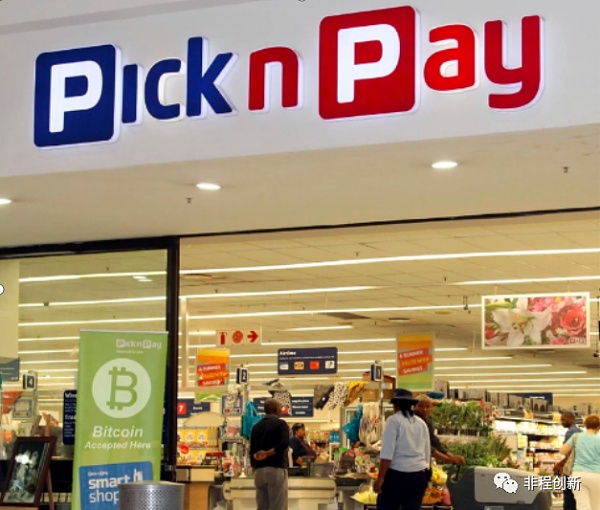
Bitcoin payment promotional page in front of a Pick n Pay store
Previously, some online retailers in South Africa had started accepting cryptocurrencies, covering various daily necessities and services. South Africa's largest e-commerce platform, Takealot, announced acceptance of cryptocurrency payments as early as 2014. Other platforms supporting Bitcoin payments include the clothing discount e-commerce platform RunwaySale, the fashion online store House of Sacks, the coffee bean e-commerce site Cape Coffee Beans, the electronic device repair service weFix, the online gift store Custom Candies, the tea e-commerce site The Tea Merchant, the hobby supplies online store RC King, the imported furniture retailer Nevada Furniture, the audiovisual equipment online store Audico, the solar leasing investment online platform The Sun Exchange, and the online skateboard store Baseline, among others. In addition, there are many providers of vouchers, prepaid cards, and gift cards that support cryptocurrency payments, which can be used to purchase goods and services from more retailers. The local blockchain wallet company Momint claims that users can purchase vouchers from the voucher platform 1Voucher through its platform, which can be used to buy products from over 10,000 local retailers and more than 5,000 international retailers in South Africa.
Previously, retailers accepting cryptocurrency payments were mainly online platforms. Now, with Pick n Pay, which holds a 16% share of the retail market, fully supporting Bitcoin payments in its offline stores, this marks a significant advancement in the application of cryptocurrency payments and will have a very positive impact on South Africa's cryptocurrency market, undoubtedly encouraging more retailers to accept cryptocurrency payments.
Why is Cryptocurrency Thriving in South Africa?
Among African countries, South Africa is one of the friendliest in terms of cryptocurrency regulatory policies. The South African Reserve Bank (SARB) has not explicitly prohibited the use of cryptocurrencies, allowing individuals and businesses to buy, sell, and trade cryptocurrencies through various exchanges and platforms.
In 2021 and 2022, the South African Reserve Bank, along with regulatory bodies such as the Financial Sector Conduct Authority (FSCA), developed recommendations for a cryptocurrency regulatory framework, suggesting that cryptocurrency service providers—including exchanges, wallet providers, and brokers—should register with the Financial Intelligence Centre (FIC) and comply with anti-money laundering (AML) and counter-terrorism financing (CTF) requirements. On December 19, 2022, the Financial Intelligence Centre Act (FICA) amendment defined cryptocurrency service providers as "accountable institutions." This made it legally impossible to handle cryptocurrency assets anonymously in South Africa. The amendment was incorporated into the Financial Intelligence Centre Act to combat money laundering and terrorist financing.
The collapse of cryptocurrency platforms like FTX in 2022 further prompted regulators to strengthen oversight of cryptocurrency risks, requiring cryptocurrency service providers to make investors aware of the significant risks associated with market volatility, cybersecurity threats, and fraud. The advertising practice guidelines of the South African Advertising Regulatory Board were revised in January 2023 to include new requirements for cryptocurrency assets: advertisements for cryptocurrency assets in South Africa must clearly state that investing in cryptocurrency assets may lead to capital loss, and the advertisements must be easily understandable to the audience and provide clear information.
In October 2022, the FSCA determined that cryptocurrency assets (referred to as "digital representations of value") are financial products and are regulated by the FSCA under Section 1(h) of the Financial Advisory and Intermediary Services Act (FAIS). Each cryptocurrency service provider must obtain authorization from the FSCA to operate in this field and apply for such licenses. Existing providers must submit applications by the end of 2023. Cryptocurrency exchanges must register with the FSCA and comply with specific regulatory requirements, including AML and Know Your Customer (KYC) requirements. The FSCA will be responsible for overseeing and enforcing compliance with these regulations, and providers must maintain a certain level of capital and financial resources to ensure they can meet their financial obligations to customers. The FSCA has the authority to impose penalties or sanctions on cryptocurrency exchanges that do not comply with these regulations.
According to South Africa's Income Tax Act, the South African Revenue Service (SARS) has broad taxation powers, including the ability to require cryptocurrency service providers to submit financial data when necessary. SARS views cryptocurrencies as taxable intangible assets, and gains or losses from cryptocurrency assets are reported as taxable income. Any profits generated from buying and selling cryptocurrencies are subject to taxation, with rates depending on the individual's income tax bracket, currently with a maximum rate of 45%.
South African regulators have created a balanced, proactive, and transparent regulatory environment while collaborating with industry stakeholders to pave the way for the thriving development of South Africa's cryptocurrency ecosystem. At the same time, the ongoing depreciation of the currency and inflation in South Africa have prompted many South Africans to explore other forms of investment and financial transactions. With the promotion and marketing of cryptocurrency companies, cryptocurrencies have attracted the attention of many South Africans due to their decentralized and borderless nature. The cryptocurrency industry has flourished, and currently, people can conveniently purchase cryptocurrencies using South African Rand through exchanges, cryptocurrency ATMs, intermediaries, and peer-to-peer (P2P) markets. These factors have undoubtedly propelled South Africa into the era of cryptocurrency payments!
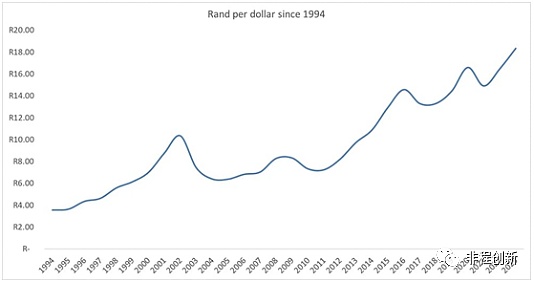
The trend of the US dollar against the South African Rand over the past thirty years
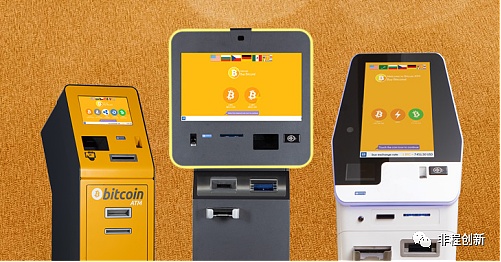
South Africa Bitcoin ATM
Africa Remains the Fastest Growing Market for Cryptocurrency
According to a report released by the globally renowned blockchain data firm Chainalysis, the cryptocurrency market in Africa surged over 1,200% from 2020 to 2022, with Kenya, Nigeria, South Africa, and Tanzania ranking among the top 20 countries globally in terms of cryptocurrency adoption rates. It is well-known that in 2022, as developed countries around the world continued to raise interest rates and liquidity tightened, cryptocurrency platforms frequently faced crises, leading to the bursting of the cryptocurrency bubble and a relative downturn in the global cryptocurrency market.
According to Chainalysis's recently released 2023 Global Cryptocurrency Geography Report, entering 2023, the cryptocurrency activity index in low- and middle-income countries began to rebound, showing a stronger recovery than in middle- and high-income countries. African countries such as Nigeria (ranked 2nd), Morocco (ranked 20th), Kenya (ranked 21st), Ghana (ranked 29th), and South Africa (ranked 31st) ranked high, with Nigeria experiencing a 9% year-on-year growth in the first half of 2023, while Uganda had the fastest growth rate at 245%, reaching $1.6 billion. The proportion of transaction volume from "large retail and small retail payments" in the African market is higher than the global average, indicating that the African market is primarily driven by retail investors rather than institutional investors. Additionally, stablecoins like USDT account for over 50% of transactions in Africa due to their ability to hedge against local currency depreciation.
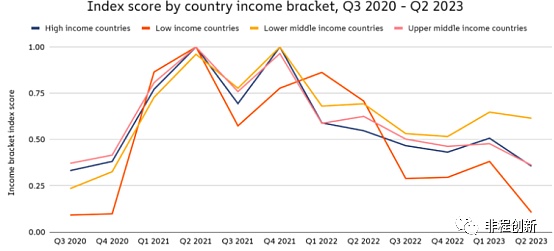
Index comparison of different income countries (Source: Chainalysis)
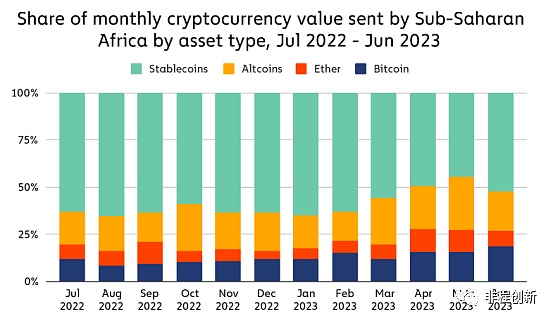
Proportion of cryptocurrency in Sub-Saharan Africa (Chainalysis)
Chainalysis analysis suggests that compared to the lowest-income countries, the data communication infrastructure in middle- and low-income countries can better support digital currency transactions. Additionally, compared to middle- and high-income countries, the depreciation of local currencies and inflation are more severe in middle- and low-income countries, along with a large unbanked population, which drives a stronger demand for cryptocurrencies among people in Africa and other middle- and low-income countries. People are more inclined to use cryptocurrencies as a tool to increase savings and hedge against inflation, while cryptocurrencies also allow for more convenient and lower-cost transactions and remittances, reaching US dollars.
Although most African countries do not yet have clear regulatory policies like South Africa, and some even prohibit cryptocurrency trading, cryptocurrencies have already permeated the daily lives of many African residents. Cryptocurrencies have become a necessary tool for some young middle-class individuals to hedge against local currency depreciation and evade foreign exchange controls. Bans have not been able to stop the growth of local cryptocurrency trading volumes, with Nigeria being the most typical example. Since 2008, the Nigerian Naira has depreciated by 90% against the US dollar, and in June 2023, the new government's relaxation of official exchange rate controls led to a 50% drop in the Naira's exchange rate against the dollar in the open market. Despite the Nigerian central bank's prohibition of cryptocurrencies, the P2P trading volume of cryptocurrencies in Nigeria has significantly increased during the same period.
Reference:
https://www.zenledger.io/blog/south-africa-and-cryptocurrency-regulation-navigating-the-path-to-financial-innovation/
https://schoemanlaw.co.za/bitcoin-in-south-africa-opportunities-and-challenges/
https://cointelegraph.com/learn/cryptocurrency-regulations-in-south-africa
https://www.chainalysis.com/blog/2023-global-crypto-adoption-index/











